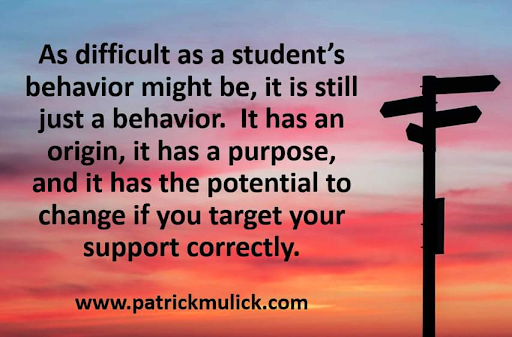|
This month, I plan to continue to highlight the evidence based practice of establishing the ‘function of behavior’. As I highlighted last month, in the introductory article (part one), this is such an important strategy to understand and highlight as the function of behavior, or more simply the ‘why the person is doing what they are doing’, ultimately helps establish a more successful response or strategy. This is a foundational understanding when trying to support anyone, but especially someone with autism. This can be more difficult for non-verbal people but there are many other ways to communicate the why of a certain action as well. Please see the October edition if you wish to see the first part of this article for the background information. As we search for a true solution for supporting someone when looking at the function of behavior, we need to be careful about how we discuss the situation. For example, if we are describing someone as “lazy”, what we observe may be that the learner does not complete the task they doing. Why might this be the case (true function of behavior)? The work or task may have been too difficult, too easy/understimulating or the performance may not have been consistently reinforced. That is to say, the learner may have needed more verbal praise or visual reminders to keep them motivated and interested.
Another example could be that we are describing someone as “violent” and what we observe may be that the learner is hitting others. Why might this be the case/the potential true problem may be? The learner may be trying to ‘get suspended’ or taken out of particular situation they actually find undesirable. The learner may get peer support or admiration for being tough and feel they are gaining power or respect. A learner may be getting different forms of reinforcement as a result of this behavior. There could be a sensory issue. I remember my own child, when he was a toddler, would hit me violently when he would get hurt at all. It seemed so unexpected and this was pre-diagnosis so I was genuinely confused at his violent outburst. Pain sensitivity played a part I suspect now. Another situation, one may describe a learner as “oppositional” when we observe the learner protesting when directions are given. What may actually be the case could be that the task is simply too difficult, the task was not chunked small enough, too many verbal instructions were given, the directions were just not understood, or the learner has experienced that by protesting before the task begins they are sometimes allowed to avoid the task altogether. I remember trying this myself as a child when it was time to clean my room: when my mother was tired, I realized she would give into my ‘tantrums’ more easily and I could avoid cleaning my room at all. Remember, these strategies are good for all, critical for some…. Lastly, I will highlight that we need to recognize and respect the energy levels of the learners (any age). Behavior can fluctuate from day to day or even hour to hour. What was possible one day may not be possible the next or vice versa. Remember to keep these questions in mind: What am I asking of him/her? What has he/she already done? How taxing has the day been so far? How taxing is the event or task coming up? Does he/she need a break? What are their current behaviors trying to communicate to me? For example, what one can accomplish after a great nights’ sleep and hearty breakfast may differ from what one is able to do after a long day of work or when feeling cold, hot, hungry, tired, etc. When you are trying to determine the true function of a learners’ behavior, it is important to follow a few key steps:
0 Comments
Leave a Reply. |
Filter Posts by Topic
All
AuthorCarmen has been published in a variety of online and print articles. Writing is a passion and she strives to grow and share her message. |
Photos from shixart1985 (CC BY 2.0), JLaw45, Goat Tree Designs, osseous, wuestenigel, shixart1985


 RSS Feed
RSS Feed